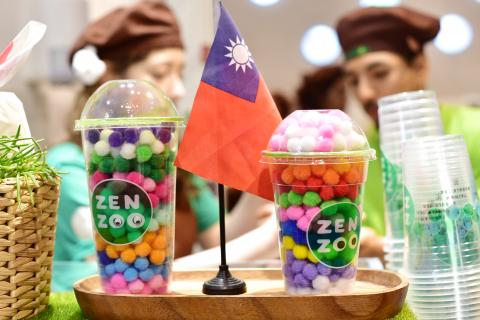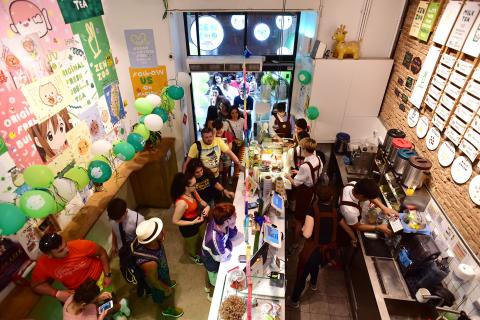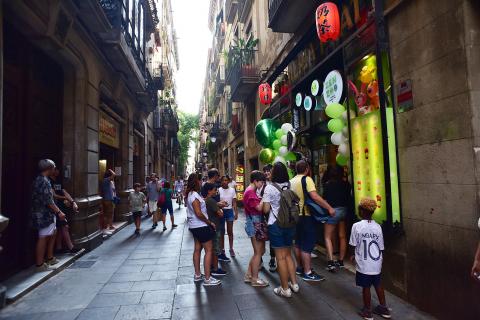When Jorge Cheng (陳賢文) set up shop in Barcelona in 2013, he had no idea he was riding a Taiwanese wave.
“There were already eight drinks shops, which we didn’t know initially,” says Cheng, owner of Zenzoo, a Taiwan-style bubble tea drinks store just off Las Ramblas, Barcelona’s iconic thoroughfare. “Three of them turned out to be very close to each other. It just so happened that we found our shop in the area.”
Yet, while local interest had been piqued by these forerunners, naysayers cast doubt over Zenzoo’s focus on its flagship product.

Photo courtesy of Zenzoo
“People were telling us, ‘Tapioca: People are not going to like it,’ and ‘you’ve got make it more westernized,’” Cheng says. “We didn’t buy that.”
The customers did — the drinks that is. Attitudes soon went from bewilderment at the inclusion of what was considered a food item to curiosity and open-armed embrace.
“The zhenzhu (珍珠, pearl) is now our top seller,” says Cheng. “Two kilos of the black pearls sells out in half an hour. Locals are choosing the traditional Taiwanese drinks over more familiar stuff.”

Photo courtesy of Zenzoo
Located amid the grandeur of Barcelona’s Gothic Quarter, Zenzoo fits with its surroundings while retaining elements of a Taiwanese hole-in-the-wall vendor. Cheng credits his graphic designer wife with this successful fusion.
“We didn’t want the regular Chinese plastic bubble tea shop, but something where people passed by and said ‘Wow! What is that?’”
Inside, the walls glow with neon signs, the most eye-catching of which is a multilingual display with the Chinese character for “tea” (茶) above the words “bubble tea” and quiero (Spanish for “I want.”). The final letter of “tea” has been rendered in green plastic, setting it off from the rest of the word, so the sign can also be read as te quiero (“I love you”). Cheng is clearly fond of wordplay hence the quirky rendering of zhenzhu in the shop’s name.

Photo courtesy of Zenzo
Zenzoo has also created its own set of bubble characters, which adorn its products and are redolent of the cutesy stickers on messaging apps such as Line.
“They symbolize our great variety of toppings and dynamic customer base,” says Cheng in flawless marketese.
Not every design element succeeded.
“When we started out we had this long sofa made of [artificial] grass, which resembled Taiwan’s tea terraces. That was really awesome until the local government told us, ‘You’re not allowed to have seats in your establishment.’ That was a shame.”
There was little in Cheng’s professional background to suggest his current career. The son of a Spanish mother and a Taiwanese diplomat who served in Latin America, Miami and Spain, Cheng was born in Madrid before schooling in Taipei.
“It has to do with love,” Cheng says, referring to the decision to quit his job and go into business with a partner that would become his wife.
“We ended up walking around Barcelona and saw our future shop right there. We both fell in love with the space,” he says.
With competition close at hand, Cheng believes that what sets Zenzoo apart is a determination to provide only “the real stuff” to customers.
“I don’t think we’re more authentic than the others, but we definitely take pride in our Taiwanese heritage and the traditional tea making process as opposed to artificial shortcuts,” he says.
Yet he is not averse to experimentation.
“We create new flavors, using local ingredients, and play around with local sweets and toppings. We also come out with new stuff every season and surprise our customers during Halloween and local holidays,” Cheng adds. “But we don’t compromise just to sell more.”
Following the opening of the Barcelona store in 2013, a branch was established in 2017 in Madrid, where Zenzoo cooperated with the Taipei Economic and Cultural Office in Spain — Taiwan’s de facto embassy — to offer drinks for the Double Ten Day celebrations. The following year, Zenzoo expanded to the western city of Salamanca, and a further outlet opens this month in an, as yet, undisclosed overseas location.
Not everyone is taken by the bubble tea phenomenon, but Cheng remains unfazed.
“People who come to me and say, ‘What is this? This is weird. That’s artificial,’ are probably not going to be my customers,” Cheng says. Instead, he sees his market as the more adventurous types. “In Spanish we say despertar — to awake,” he says. “And that’s what we want, to awake those exotic flavors that we can bring to the local culture. That’s what it’s all about.”

On April 26, The Lancet published a letter from two doctors at Taichung-based China Medical University Hospital (CMUH) warning that “Taiwan’s Health Care System is on the Brink of Collapse.” The authors said that “Years of policy inaction and mismanagement of resources have led to the National Health Insurance system operating under unsustainable conditions.” The pushback was immediate. Errors in the paper were quickly identified and publicized, to discredit the authors (the hospital apologized). CNA reported that CMUH said the letter described Taiwan in 2021 as having 62 nurses per 10,000 people, when the correct number was 78 nurses per 10,000

As we live longer, our risk of cognitive impairment is increasing. How can we delay the onset of symptoms? Do we have to give up every indulgence or can small changes make a difference? We asked neurologists for tips on how to keep our brains healthy for life. TAKE CARE OF YOUR HEALTH “All of the sensible things that apply to bodily health apply to brain health,” says Suzanne O’Sullivan, a consultant in neurology at the National Hospital for Neurology and Neurosurgery in London, and the author of The Age of Diagnosis. “When you’re 20, you can get away with absolute

May 5 to May 11 What started out as friction between Taiwanese students at Taichung First High School and a Japanese head cook escalated dramatically over the first two weeks of May 1927. It began on April 30 when the cook’s wife knew that lotus starch used in that night’s dinner had rat feces in it, but failed to inform staff until the meal was already prepared. The students believed that her silence was intentional, and filed a complaint. The school’s Japanese administrators sided with the cook’s family, dismissing the students as troublemakers and clamping down on their freedoms — with

As Donald Trump’s executive order in March led to the shuttering of Voice of America (VOA) — the global broadcaster whose roots date back to the fight against Nazi propaganda — he quickly attracted support from figures not used to aligning themselves with any US administration. Trump had ordered the US Agency for Global Media, the federal agency that funds VOA and other groups promoting independent journalism overseas, to be “eliminated to the maximum extent consistent with applicable law.” The decision suddenly halted programming in 49 languages to more than 425 million people. In Moscow, Margarita Simonyan, the hardline editor-in-chief of the